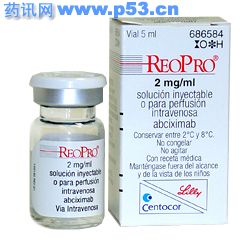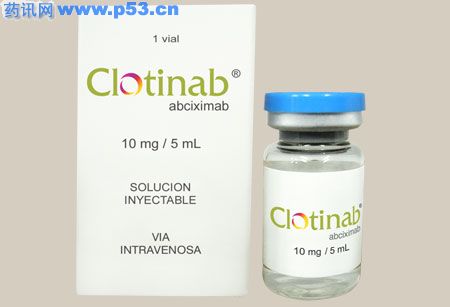| Generic Name for REOPRO Abciximab 2mg/mL; soln for IV inj; preservative-free. Legal Classification:
Rx Pharmacological Class for REOPRO
Antiplatelet (GP IIb/IIIa blocker). Manufacturer of REOPRO
Centocor Ortho Biotech Inc. Indications for REOPRO
Adjunct to percutaneous coronary intervention (PCI) for prevention of cardiac ischemic complications: in patients undergoing PCI and; in patients with unstable angina not responding to conventional medical therapy when PCI is planned within 24hrs. For use with heparin and aspirin. Adult dose for REOPRO
0.25mg/kg IV bolus administered 10–60 minutes before start of PCI, followed by a continuous IV infusion of 0.125micrograms/kg/min (max 10micrograms/min) for 12 hrs. Unstable angina not responding to conventional therapy: 0.25mg/kg IV bolus followed by an 18–24hr IV infusion of 10micrograms/min, concluding 1hr after PCI. Children's dosing for REOPRO
Not recommended. Contraindications for REOPRO Active internal bleeding. GI or GU bleeding within 6 wks. Cerebrovascular accident within 2yrs or with residual neurologic deficit. Bleeding diathesis. Oral anticoagulants within 7 days, unless prothrombin time ≤1.2 times control. Thrombocytopenia. Major surgery or trauma within 6 wks. Intracranial neoplasm, arteriovenous malformation, or aneurysm. Severe uncontrolled hypertension. Vasculitis. IV dextran before or during PCI. Warnings/Precautions for REOPRO
See literature. Increased risk of bleeding when PCI within 12hrs of MI symptom onset, PCI lasting >70min, failed PCI. Discontinue infusion if uncontrolled bleeding occurs. Properly care for femoral artery access site to minimize bleeding. Minimize other arterial and venous punctures, IM inj, catheter use, intubation, NG tube, automatic BP cuffs, to lower bleeding risk; avoid use of non-compressible IV access sites. Discontinue heparin 2hrs prior to arterial sheath removal. Monitor prothrombin time, ACT, APTT, and platelet count before and during treatment. Discontinue if confirmed thrombocytopenia occurs. Pregnancy (Cat.C). Nursing mothers. Interactions for REOPRO
Risk of bleeding increased with concomitant heparin, thrombolytics, anticoagulants, NSAIDs, dipyridamole, and ticlopidine. Adverse Reactions for REOPRO
Bleeding, intracranial hemorrhage, stroke, thrombocytopenia, hypersensitivity reactions, hypotension, bradycardia, GI upset, abdominal-, back-, chest-, and puncture site pain, peripheral edema, arrhythmias. How is REOPRO supplied?
Vial (5mL)—1 适应症
参见用法用量。 适应症/成人常用量 静脉给药 不稳定型心绞痛;经皮冠脉介入 (PCI)治疗期间辅助用药预防急性缺血发作 250 mcg/kg,静脉小壶,然后以0.125 mcg/kg/分的速率滴注(最大:10 mcg/分)。不稳定型心绞痛:最早在PCI前24小时开始滴注至手术后12小时。预防PCI急性缺乏并发症:PCI前 10-60分钟开始滴注,直至手术后12小时。 点击查看不同适应症和各年龄组别患者的用法用量
禁忌
以下情况禁用:对本药任何成份或鼠类蛋白质过敏,活动性出血,近期(6周以内)胃肠道出血或有临床意义的泌尿生殖系出血,2年内脑血管意外或遗留明显神经系统缺陷,出血体质,血小板减少症(<10000/uL),凝血功能异常,1周内曾使用口服抗凝药,近期(6周)外科大手术或创伤,颅内肿瘤,动静脉畸形或动脉瘤,严重未控制的高血压,重度肝肾功能损害,可疑或明确的脉管炎病史,PTCA术前或术中需静脉注射右旋糖苷。 注意事项 以下情况慎用:75岁以上的老人,妊娠和哺乳期妇女、18岁以下儿童,体重低于75 kg,近期溶栓治疗和经皮冠状动脉成形术未成功的患者。再次给药,合用溶栓药、抗凝药和其它抗血小板药物,静脉开放和/或动静脉穿刺/插管的患者。给药前,检查血小板计数、凝血酶原时间和活化部分凝血活酶时间,明确是否存在凝血异常。
不良反应 低血压、心动过缓、胸骨后或胸痛、心房颤动/扑动、恶心、呕吐、头痛、发热、血肿、血管疾病、贫血、白细胞增多、感觉迟钝、精神混乱、思维异常、头晕、胸膜炎、胸腔渗液、肺炎、尿路感染、疼痛、周围水肿、视力异常、发音困难、瘙痒症、溶血性贫血、皮肤淤斑。 严重不良反应: 出血(给药后首3个小时,如胃肠道、泌尿生殖道、腹膜后)、血小板减少、产生抗人嵌合抗体。 药物相互作用 人抗嵌合抗体(HACA)阳性的患者如使用其它诊断性或治疗性单克隆抗体,可能出现过敏或超敏反应。
严重药物相互作用: 合用溶栓药、抗凝药和其它抗血小板药,增加出血的风险。 查看 详细药物相互作用 FDA妊娠分级 C级: 动物研究证明药物对胎儿有危害性(致畸或胚胎死亡等),或尚无设对照的妊娠妇女研究,或尚未对妊娠妇女及动物进行研究。本类药物只有在权衡对孕妇的益处大于对胎儿的危害之后,方可使用。 法国研究者报告,对急性ST段抬高的心肌梗死(STEMI)患者的长期随访显示,进行支架置入同时接受GPIIb/IIIa受体抑制剂阿昔单抗(abciximab )的患者比只接受支架置入的患者有较高的生存率。 Pitie-Salpetriere大学医院的Gilles Montalescot医生说,药物的初始益处在3年的随访中持续存在。先前的研究只对患者随访了30天。在12月的《欧洲心脏杂志》(Eur Heart J 2005; 26:2520-2523)上,Montalescot医生及其同事指出,本研究继续随访接受了阿昔单抗以及支架置入的149例STEMI患者。另外151例患者接受安慰剂和支架置入。
对288例患者盲随访3年并使用意向-治疗分析显示,全因死亡率阿昔单抗组为9.1%,安慰剂组为12.2%。死亡或再梗死的累及发生率阿昔单抗组为11.8%,安慰剂组为16.9%。阿昔单抗组复发性缺血也显著减少(11.5% vs 21.7%)。
Montalescot医生总结说,使用基础血管成形术治疗的ST段抬高的心肌梗死是使用GPIIb/IIIa抑制剂的最佳临床指征。 |
阿昔单抗注射剂(Abciximab, ReoPro,Clotinab)——使用阿昔单抗对急性心肌梗死患者有长期益处责任编辑: |
最新文章更多推荐文章更多热点文章更多
|



